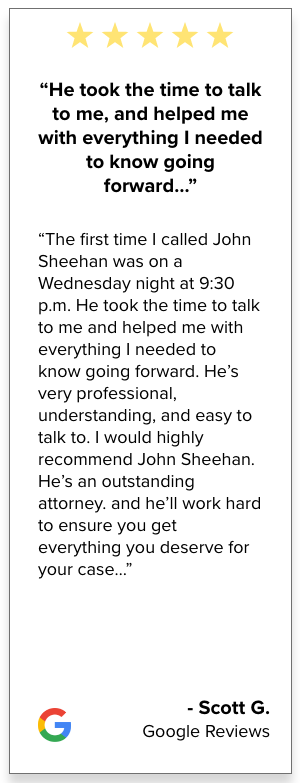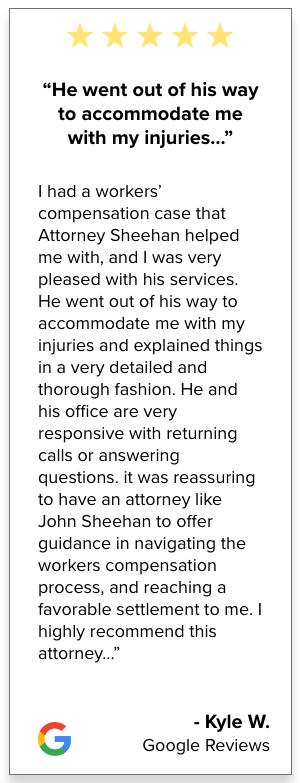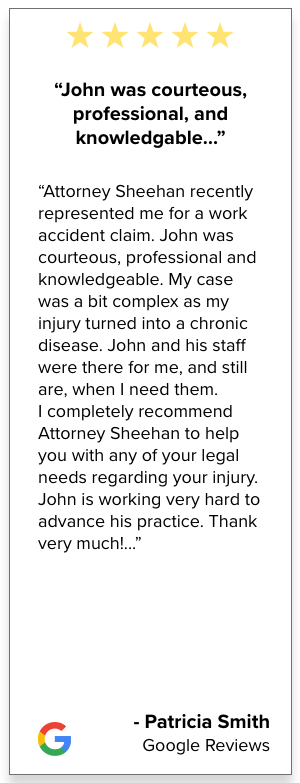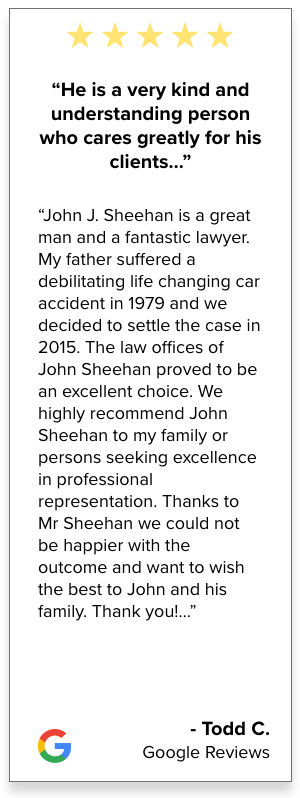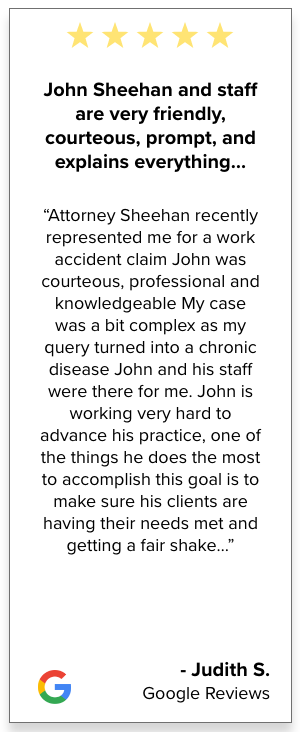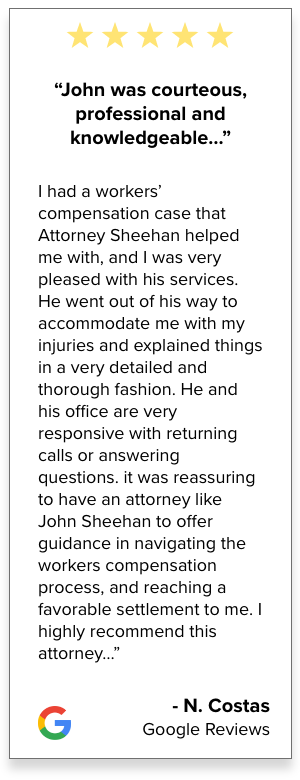Chelmsford, MA Personal Injury Lawyer
When someone suffers a personal injury, it can be an incredibly shocking experience, often leaving victims feeling lost, alone, and unsure of what steps to take next. However, if you have been injured because of someone else’s negligence, pursuing a personal injury lawsuit can help you assert your rights and regain control of your life.
That is why our firm is here to work with you, providing you with the support and guidance you need to hold the negligent party accountable for their actions. With decades of collective experience representing clients in a variety of personal injury cases, our team is well-equipped to handle any type of claim you might have. Regardless of the accident you were injured in, we are ready to fight for your rights and help you obtain the compensation you deserve.
Reach out to the Law Office of John J. Sheehan by calling (617) 925-6407 for a free case evaluation with our personal injury attorneys.
Understanding the Personal Injury Litigation Process in Chelmsford, MA
Navigating the litigation process can be complex and stressful. However, understanding the process can help alleviate some of that stress and empower you to make informed decisions about your case. Remember, though, every case is unique, and the process might vary depending on the specific circumstances of your case. In most cases, your lawsuit will follow the steps detailed below:
Initial Consultation
The first step in the litigation process is to schedule an initial consultation with one of our experienced personal injury attorneys. During this consultation, you will have the opportunity to discuss the details of your case and provide a thorough account of how the injury occurred, the extent of your injuries, any medical treatment received, and how the injury has affected your life.
Our team will carefully evaluate the strength of your case, taking into account a range of factors such as the severity of your injuries, the amount of medical expenses incurred, and the potential impact on your future earning capacity. We will explain your legal rights and help you understand the legal process, answering any questions you might have along the way.
Based on the information you provide, we will work with you to develop a personalized legal strategy that is tailored to your specific needs and goals. This strategy might involve negotiating a settlement with the other party, filing a lawsuit in court, or pursuing alternative methods of dispute resolution.
Investigation and Gathering Evidence
Should you decide to move forward with your case, our team will then begin a comprehensive investigation. We will leave no stone unturned in gathering evidence that will help build a strong case on your behalf. This could involve obtaining police reports, medical records, witness statements, photographs of the scene, and any other relevant documentation.
Furthermore, your attorney might also consult with experts in relevant fields, such as medical professionals or accident reconstruction specialists, to gain further insights and strengthen the case. The attorney will work tirelessly to ensure that every aspect of the case is thoroughly examined and that all details are accounted for.
The ultimate goal of this investigation process is to ensure that your case is presented in the best possible light and that you receive the justice you deserve. By gathering and presenting compelling evidence, we have the best chance of establishing liability on behalf of the responsible party and maximizing the compensation you can recover.
Filing the Complaint
After our team has gathered all the necessary evidence, we will proceed to file a complaint in the appropriate court. This is a crucial legal document that outlines all the allegations you are making against the defendant, which is the party you are suing.
The complaint will also detail the legal basis for your claim, which is the reasoning behind your decision to take legal action. Additionally, the complaint will specify the damages or compensation you are seeking, which might include monetary compensation, specific performance, or injunctive relief. All of these details are important for the court to consider when determining the outcome of your case.
Discovery
After a complaint is filed, both parties enter the discovery phase. During this phase, the parties exchange information about the case through various methods. One of the methods used is interrogatories, which are written questions that must be answered under oath. This helps each side gain a better understanding of the other’s position.
Another method used is depositions, which are sworn out-of-court testimonies. They allow the parties to question witnesses, including the other side’s witnesses and experts. It is similar to a trial but without a judge or jury present.
Finally, requests for documents can also be made during this phase. These requests can include anything that is relevant to the case, such as contracts, emails, and other forms of evidence.
The discovery process is crucial for both sides to fully understand the facts of the case before trial. It helps them prepare their arguments and evidence and can also lead to a settlement before the case goes to trial.
Negotiation and Settlement
In many instances, personal injury cases can be resolved without the need for a trial through a process of negotiation and settlement. In this phase, your attorney will represent you and will negotiate with the defendant’s insurance company or attorney in an attempt to reach a mutually acceptable settlement. This typically involves a back-and-forth discussion of the details of the case, including the extent of your injuries, the costs of medical treatment and rehabilitation, and the impact that the injury has had on your quality of life.
Once an agreement is reached, you will be asked to sign a release and waiver of liability, which essentially means that you agree to drop your lawsuit in exchange for the agreed-upon compensation. It is important to note that while settlements can often be a quicker and less expensive option than going to trial, they might not always result in the compensation that you feel you are entitled to. That is why it is crucial to have an experienced personal injury attorney on your side who can help you navigate this process and ensure that your rights are protected.
Trial
In the event that a mutually agreeable settlement cannot be reached between the parties involved, your case will proceed to trial. During the trial, both sides will be given the opportunity to present their respective evidence, arguments, and supporting documents to the judge or jury.
The judge or jury will then carefully examine and consider all of the evidence presented to them before making a final decision on whether the defendant is liable for your injuries or not. If the judge or jury determines that the defendant is indeed liable, they will then proceed to determine the appropriate amount of compensation to be awarded to you in order to fully compensate you for your injuries and any other damages you might have sustained as a result of the incident in question.
Knowing What Compensation You Are Entitled to is Key to a Successful Personal Injury Lawsuit in Chelmsford, MA
It is also important to understand the different types of compensation you might be entitled to so that you are fully covered throughout your recovery. These can include economic damages like medical expenses and lost wages, as well as non-economic damages like pain and suffering, emotional distress, and more.
Medical Expenses
When a person suffers a personal injury, one of the most immediate and pressing concerns is the hefty cost of medical treatment. Depending on the severity of the injury, victims might require hospitalization, surgeries, medication, rehabilitation, and long-term therapy. All of these expenses can quickly add up and cause a significant financial strain on the victim and their family.
To alleviate this burden, individuals who have suffered a personal injury might be compensated for their medical expenses. This includes the costs of all hospital stays, surgeries, medication, and other treatments that were necessary to treat the injury. Additionally, any future medical expenses that are expected to arise because of the injury might also be covered.
However, it is crucial to keep detailed records of all medical bills and expenses related to the injury. This documentation will serve as evidence when making a claim for damages and will help ensure that the victim receives fair and just compensation for their medical expenses.
Lost Wages
If your injury caused you to miss work, you might be entitled to recover lost wages. This includes any income you lost while recovering and any sick or vacation days you had to use because of your injuries. To claim these damages, you will need proof of your regular income and the time you missed from work.
Loss of Earning Capacity
Sometimes, an injury can have long-term effects on your ability to work. If your injury has diminished your ability to earn a living, either by preventing you from working entirely or restricting the type of work you can do, you can claim loss of earning capacity. Calculating this requires considering your age, skill set, occupation, and how much you could have expected to earn in the future if not for your injury.
Pain and Suffering
Pain and suffering is one of the most common forms of non-economic damages in a personal injury lawsuit. It covers the physical pain and discomfort endured by the victim because of their injuries. Calculating pain and suffering damages can be complex, as it involves assigning a monetary value to subjective experiences. Factors such as the severity and duration of the pain, the nature of the injury, and the disruption caused to the victim’s life are typically considered.
Emotional Distress
Emotional distress compensates victims for the psychological impact of their injuries. This can include conditions like anxiety, depression, post-traumatic stress disorder (PTSD), and any other emotional and psychological trauma resulting from the accident. Proving emotional distress often requires medical and psychological records, and expert testimony might also be needed.
Loss of Enjoyment of Life
Loss of enjoyment of life, also known as hedonic damages, compensates victims for the detrimental impact the injury has had on their ability to enjoy day-to-day activities, hobbies, exercise, and other sources of enjoyment. Like other non-economic damages, it is subjective and can vary greatly from case to case.
Loss of Consortium
Loss of consortium refers to damages awarded to a spouse for the loss of companionship, affection, comfort, and sexual relations because of their partner’s injury. It recognizes the adverse effect an injury can have on a marital relationship. In Chelmsford, a claim for loss of consortium can only be brought if the injured party is married.
Disfigurement and Scarring
If an injury leads to significant scarring or disfigurement, victims might be compensated for the negative impact on their appearance and the associated psychological distress. This includes scars from burns, lacerations, surgeries, and amputations.
Property Damage
In case you have suffered an injury because of an accident that also caused damage to your personal property, like your car in a car accident, you have the right to claim the cost of repairing or replacing your property. This means that you can seek compensation for the expenses incurred in fixing or replacing the damaged property as long as the damages were directly caused by the accident. However, the compensation amount might vary based on the extent of the damage and the cost of repair or replacement.
Out-of-Pocket Expenses
You might also be entitled to any miscellaneous costs you have incurred as a direct result of the injury. These costs can be wide-ranging and cover a variety of expenses, including but not limited to travel expenses for medical appointments or the cost of hiring help for household chores that you are no longer able to perform because of your injuries. For example, if your injury has left you unable to perform routine household tasks such as cleaning or cooking, you might need to hire someone to help you with these tasks.
Similarly, if you have had to travel to attend medical appointments or receive treatment for your injury, the cost of transportation, such as gas, parking fees, or public transportation fares, can be included in your economic damages. These incidental expenses can add up quickly and might have a significant impact on your financial resources, so it is important to keep track of all relevant costs and expenses to ensure that you receive the compensation you are entitled to.
Punitive Damages
Punitive damages are not designed to compensate the victim but rather to punish the defendant for particularly egregious or malicious conduct and deter similar behavior in the future. In Massachusetts, punitive damages are only awarded in wrongful death cases where the defendant’s conduct was grossly negligent or intentional.
Our Chelmsford, MA Personal Injury Lawyers Can Help
To get your free case review with our personal injury attorneys, call the Law Office of John J. Sheehan at (617) 925-6407.


